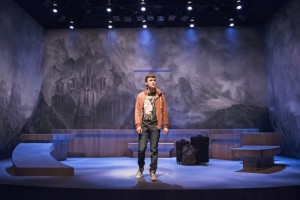As students, we’re often too focused on our coursework to assess our own mental health or that of those around us. We consider the victims of police aggression and devastating mental illness to be beyond us, fleeting figures in dashcam videos and quivering cell-phone recordings whose altercations are to be put on trial on YouTube.
The Belfry and Victoria playwright Joan MacLeod, with their history of producing and showcasing both topical and thought-provoking works, are now presenting The Valley, a play that examines the chronic struggle between law enforcement, mental illness, and society in an intimate and poignantly human narrative.
“All [MacLeod’s] characters are real people. She doesn’t write them as stereotypes or caricatures,” says actor Luc Roderique, making his Belfry debut as Vancouver police officer Dan.
The cast of four characters (a cop, his wife, a struggling student, and his mother) and their physical and emotional afflictions are pulled together by a brutal incident at a Vancouver SkyTrain station. The true sequence of events slowly unravels as the audience sees how each character copes.

“Connor is an 18-year-old first-year university student and writer who comes back home and is in a lot of mental distress,” says actor Matt Reznek about Connor, the character he plays. “He has a psychotic episode at a SkyTrain station and has an altercation with a police officer [Dan]. The play is about the repercussions of that incident.”
Inspired by the events surrounding the Robert Dziekanski tasering at Vancouver International Airport, the work aims to explore the human factor involved in reactive incidents and to move beyond the cut-and-dried interpretations often presented in media.
“There is a certain ambiguity to the script, where you are constantly shifting allegiance between the characters,” says Roderique. “We get to see Dan on the job, but then you also get to see him in private moments where he gets to talk about how he feels about his job and relationship candidly. We can forget [people in law enforcement] have private lives, struggles, emotions, and kids, and they can be a little messed up just like us.”
The freedom to explore their characters beyond an archetype has helped both actors authenticate the sense that these events could happen to anyone, and that often those who have great potential suffer silently.
“The creative mind and temperament is always attributed to mental illness,” says Reznek. “For another writer it could have the danger of seeming like it is a stereotype, but the way it is presented is that’s it’s just misunderstood. We as a society can’t distinguish between genius and insanity; there is a very thin line. It’s important to the story that he has the potential for greatness; it’s more tragic.”
The portrayal of a brilliant but conflicted young artist and student is even more critical as Camosun students begin to neglect their mental health in haste to cram for final exams and midterms.
“I know if there ever was a point where I came close to breaking, it was during college,” adds Roderique.
Unbroken by the prospect of the play’s four-week run, the cast have faith their work will draw in and engage audiences of all demographics.
“There’s been some very ambiguous mixed debates, which is exactly what we were hoping for,” says Roderique. “That’s what I think theatre should do: it should spark questions and debates and discussions.”
A subversive player in the mental-health debate, The Valley intends to promote change through open discourse, an activity that residents of Victoria and Camosun students alike crave. The play tackles events that are relevant to those far away from the college grounds, as well.
“It’s easily transferable to the world, not necessarily just Canada,” says Reznek.
The Valley
February 2 to 28
$23 to $48, The Belfry
belfry.bc.ca
